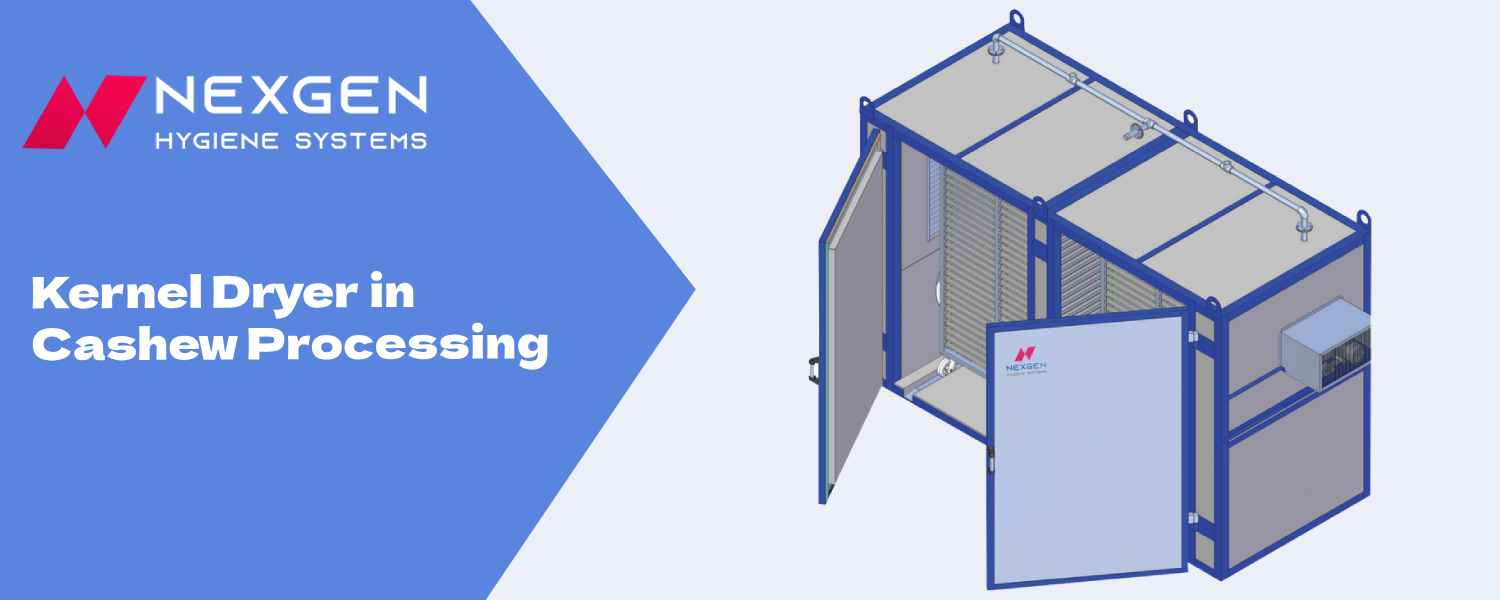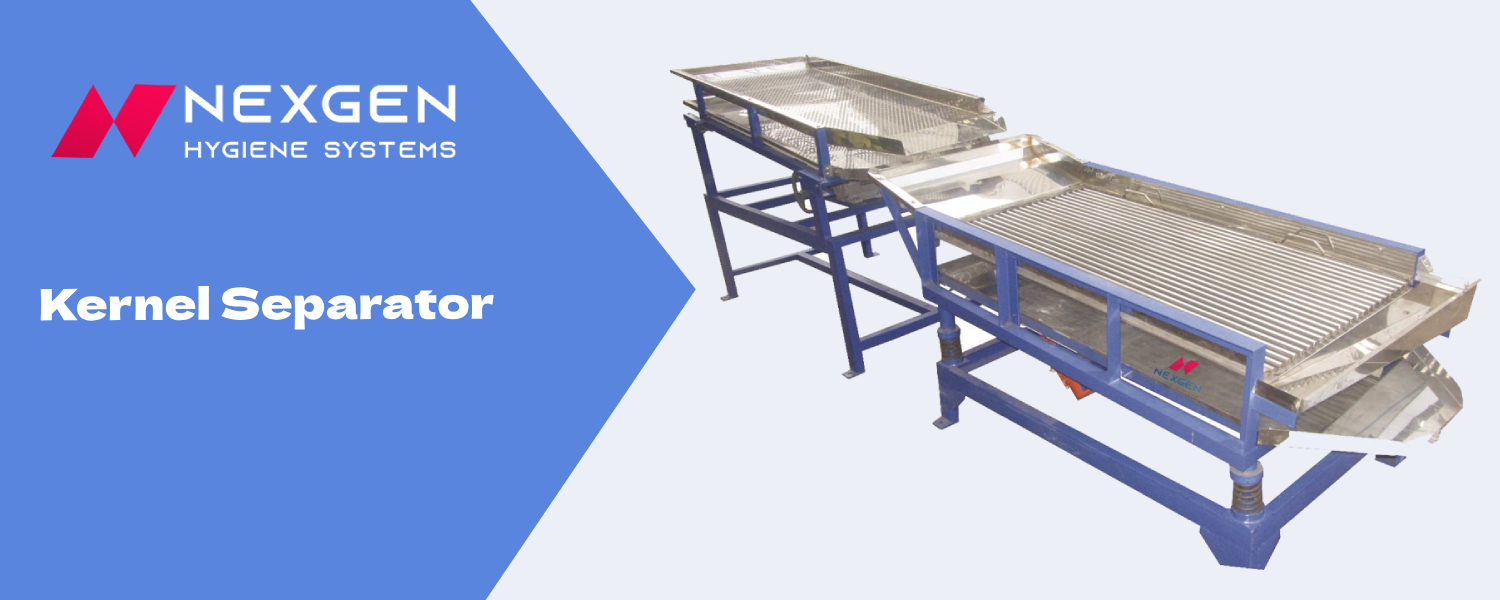Cashew processing is a delicate balance of precision, timing, and technique. Every step, from peeling to grading, plays a role in determining final yield and product quality.
Among these stages, kernel drying and kernel separation stand out as critical processes that can either make or break your operation’s profitability.
At Nexgen, we design cashew processing machines that prioritize yield optimization without sacrificing quality. This guide highlights how investing in the right kernel dryers and separators can maximize your cashew yield, reduce waste, and build a more efficient, reliable production line.
Why Yield Matters in Cashew Processing
Before we discuss “how,” it’s important to understand “why” yield is critical in the cashew processing industry:
Profitability
Cashew kernels are graded by size, color, and quality — all of which determine their market value. A higher yield of premium-grade kernels directly impacts your profits.
Product Quality
Careful processing preserves the color, texture, and taste of cashew kernels. Quality degradation due to improper drying or faulty separation results in lower-grade outputs and financial loss.
Operational Efficiency
Efficient use of cashew processing machines like dryers and separators reduces wastage, labor dependency, and reprocessing costs — improving overall plant efficiency.
Importance of Kernel Dryers in Cashew Processing

A kernel dryer is not just a drying machine — it’s the heart of post-peeling operations. Proper drying impacts everything that follows, from shelling to packaging.
Moisture Uniformity
Cashew kernels have high moisture content after peeling. Uniform drying reduces the moisture to safe levels (usually around 4–5%), preventing fungal growth and quality deterioration. Nexgen’s cashew processing equipment ensures uniform heat distribution, which is vital to achieving consistent results.
Crack Prevention
Overdrying can make kernels brittle, leading to breakage during grading and packaging. Controlled drying helps maintain kernel integrity, which preserves premium-grade classifications and minimizes product loss.
Energy Optimization
Modern cashew processing machines like Nexgen’s dryers are designed for energy efficiency. Automated sensors and programmable settings ensure that energy consumption is optimized without compromising drying quality — a significant factor for large-scale commercial plants.
How Kernel Separators Improve Output

After drying, cashew kernels must be graded into various sizes and quality classes. This is where kernel separators come in.
Size and Grade Accuracy
Mechanical kernel separators sort kernels based on size and weight far more accurately than manual labor. Uniform grading enhances the final presentation and maximizes the pricing potential of every batch.
Reduced Manual Sorting
Manual sorting is labor-intensive, inconsistent, and time-consuming. By integrating kernel separators into your line, you can significantly reduce labor costs and processing time — while improving accuracy.
Consistent Marketable Quality
When buyers receive consistent quality shipments, it strengthens your brand’s reputation. Automated separation ensures that broken or discolored kernels are filtered out early, preserving the premium quality of export-grade nuts.
Building an Efficient Cashew Processing Line
To maximize yield and optimize returns, the entire cashew processing system must work seamlessly:
1. Select Reliable Cashew Processing Machines
Not all cashew processing machine manufacturers design equipment with yield maximization in mind. At Nexgen, our cashew peeling machines, dryers, and separators are built to optimize both quantity and quality — offering businesses long-term reliability and higher profitability.
2. Maintain Ideal Processing Conditions
Environmental conditions like humidity, ambient temperature, and cleanliness affect both drying and separation processes. Invest in facility improvements (like dehumidifiers or insulated walls) if necessary to maintain optimal processing conditions.
3. Train Your Operators
Technology is only as effective as the people operating it. Proper training on dryer calibration, separator adjustments, and preventive maintenance ensures that your expensive cashew processing machines deliver maximum returns.
Cashew Processing: A Long-Term Business Asset
Investing in high-quality cashew processing equipment is not just about meeting today’s demand — it’s about building a business asset that will serve you reliably for years.
At Nexgen, we believe that smart investments in kernel dryers, separators, and related systems like cashew peeling machines and raw cashew sizers, combined with good operating practices, can transform a cashew processing unit into a highly profitable, sustainable venture.
Contact Nexgen today to explore our range of cashew processing machines, designed with Indian and global processing needs in mind. We’re here to help you maximize yield, improve product quality, and grow your business with confidence.
FAQs
What is the main cause of low yield in cashew processing?
Low yield is often caused by improper drying (leading to cracks) and inaccurate manual sorting. Using high-quality kernel dryers and separators can minimize these losses.
Can a Nexgen cashew processing machine handle high-volume operations?
Yes, Nexgen machines are engineered for commercial-scale operations, combining durability with high efficiency to suit both medium and large cashew processors.
How often should kernel dryers and separators be maintained?
Routine daily checks, monthly deep cleaning, and quarterly professional maintenance are recommended to keep your machines running at peak efficiency.
How do kernel separators improve profitability?
Accurate separation means higher-grade cashews, reduced wastage, and fewer labor costs — all of which contribute to a better bottom line.
Are there compliance standards for cashew processing equipment?
Yes. In India, FSSAI guidelines ensure food safety compliance, while ISO certifications confirm machine quality. Nexgen machines meet all necessary standards for safe, efficient cashew processing.
